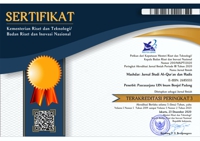Kontekstualisasi Konsep Jihad Dalam Al-Qur’an (Q.S Al-Nisa [4]: 95) Sebagai Upaya Preventif Covid-19)
DOI: 10.15548/mashdar.v2i2.1355Abstract
The concept of jihad from time to time and from generation to generation undergoes various changes depending on circumstances. However, most people only understand jihad as a battle on the battlefield with a sword or other weapon. Jihad is basically meant to exert power seriously. In the current context, in the midst of a global pandemic can resistance to the corona virus be considered a jihad? This is interesting and has novelty to study. This research is a library research (literature study). Research data sources consist of primary and secondary sources; the primary sourcis the Qur'an especially Q.S Al-Nisa [4]: 95 and secondary sources are all literature relating to the theme. The method used is descriptive-analytical method with Abdullah Saeed's contextual interpretation theory approach. Based on the results of research, resistance to the corona virus can be considered as jihad on the grounds that in the context of the first community jihad (in Q.S al-Nisa [4]: 9) was waging war to protect themselves, lives, property and others. If drawn into the context of the current pandemic, it has something in common, namely to protect lives. The difference lies in that if at that time the war against humans, while currently fighting against the virus. In relation to the intensity of the danger, it is now more dangerous because of its impacts on various things such as economic and social. If the form of jihad in the time of the Prophet was with war using weapons; swords, arrows, horses, spears, treasures and so on, so now the use of weapons; masks, soap, handsanitzer, tools of self protection, other medical devices, possessions and so on.
Keywords
Full Text:
PDFReferences
Abduh, Muhammad, and Rasyid Ridha. Tafsir Al-Manar. Vol. 5. Mesir: Haiyati a-Misriyah Al-‘Amah lil Kutub, n.d.
Abdul Baqi, Muhammad Fuad. Al-Mu’jam Mufahras Li Alfaz Al-Qur’an Al-Karim. Cairo: Dar al-Hadith, 2001.
Al-Ghazali. Ihya Ulumuddin Atau Mengembangkan Ilmu-Ilmu Agama. Translated by Ismail Yakub. 5th ed. Vol. 2. Singapura: Pustaka Nasional Pte Ltd, 2003.
Al-Qurtubi, Syamsuddin. Al-Jami’ Li Ahkam Al-Qur’an. Vol. 1. Jakarta: Pustaka Azzam, 2008.
Al-Razi, Imam Fakhruddin Muhammad Ibn. Mafatih Al-Ghayb. Vol. 1. Beirut: Dar al-Qutub, 2009.
Al-Tayyeb, Ahmad. Jihad Melawan Teror: Meluruskan Kesalahfahaman Tentang Khilafah, Takfir, Jihad, Hakimiyah, Jahiliyah, Dan Ekstrimitas. Jakarta: Lentera Hari, 2016.
Ari, Anggi Wahyu. “Jihad Menurut Ibn Kathīr Di Dalam Tafsīr Al-Qurān Al-‘Aẓīm.” Nur El-Islam 1, no. 1 (April 1, 2014): 122–43.
At-Thabari, Muhammad Ibn Jarir. Jami’ al-Bayan Fi Ta’wil Ay al-Qur’an. Vol. 9. Beirut: Dar al-Fikr, 2000.
Azman. “Jihad Perspektif Hizbut Tahrir Indonesia” 4, no. 1. Accessed July 27, 2020. http://journal.uin-alauddin.ac.id/index.php/al_daulah/article/view/1498.
Bazith, Ahamad. “Jihad Dalam Perspektif Al-Qur’an” 2, no. 1 (February 21, 2019). http://journal.uin-alauddin.ac.id/index.php/tafsere/article/view/7460.
Chen, Robert Chun, Lionel Tim-Ee Cheng, Joshua Li Liang Lim, Apoorva Gogna, David Chee Eng Ng, Louis Zhang Yi Teo, and Bien Soo Tan. “Touch Me Not: Safe Distancing in Radiology During Coronavirus Disease 2019 (COVID-19).” Journal of the American College of Radiology 17, no. 6 (June 2020): 739–42. https://doi.org/10.1016/j.jacr.2020.04.019.
“Coronavirus Could Trigger a Hunger Pandemic – Unless Urgent Action Is Taken – the European Sting - Critical News & Insights on European Politics, Economy, Foreign Affairs, Business & Technology - Europeansting.Com.” Accessed July 26, 2020. https://europeansting.com/2020/04/24/coronavirus-could-trigger-a-hunger-pandemic-unless-urgent-action-is-taken/.
“Coronavirus Disease (Covid-19).” Accessed July 26, 2020. https://www.who.int/emergencies/diseases/novel-coronavirus-2019.
“Coronavirus Is Plunging the Global Economy into Its Worst Crisis Since 2009 | Hartford Business Journal.” Accessed July 26, 2020. https://www.hartfordbusiness.com/article/coronavirus-is-plunging-the-global-economy-into-its-worst-crisis-since-2009.
“Coronavirus Update (Live): 16,196,503 Cases and 648,327 Deaths from Covid-19 Virus Pandemic - Worldometer.” Accessed July 26, 2020. https://www.worldometers.info/coronavirus/.
Fanani, M. Kholisur Rohman. “Jihad Dalam Al-Qur’an: Perspektif Semantik Tooshihiko Izutsu.” Skripsi, UIN Syarif Hidayatullah, 2019.
Fattah, Abdul. “Memaknai Jihad Dalam Al-Qur’an Dan Tinjauan Historis Penggunaan Istilah Jihad Dalam Islam.” J-PAI: Jurnal Pendidikan Agama Islam 3, no. 1 (December 29, 2016). https://doi.org/10.18860/jpai.v3i1.3992.
Haminatim. “Jihad Dalam Prespektif Al-Qur’an.” Skripsi, FUF, 1999.
Hamka. Tafsir Al-Azhar. Vol. 2. Singapura: Pustaka Nasional, Tanpa Tahun.
Irsyad, Muhammad. “Jihad Dalam Al-Qur’an: Studi Atas Penafsiran Muhammad Sa’id Ramadan al-Buti Tentang Jihad.” Tesis, UIN Alaudin Makasar, 2016.
Ismail, Abu Fida’. Tafsir Al-Qur’an al-Adzim. Vol. 1. Makkah: Dar At-Tiba’ah wa An-Nasyr, 1999.
Jayana, Thoriq Aziz. “Model Interpretasi Al-Qur’an Dalam Pendekatan Tafsir Kontekstual Abdullah Saeed” 3, no. 1 (2019).
———. “Model Interpretasi Alquran Dalam Pendekatan Tafsir Kontekstual Abdullah Saeed.” AL QUDS : Jurnal Studi Alquran dan Hadis 3, no. 1 (May 27, 2019): 37–52. https://doi.org/10.29240/alquds.v3i1.612.
Katsir, Ibnu. Tafsir Ibn Katsir. Vol. 1. Cairo: Dar al-Qutub, Tanpa Tahun.
Kholily, Aavi Lailaa. “Pandangan Abdullah Saeed Pada Konsep Nasikh Mansukh.” Nun : Jurnal Studi Alquran Dan Tafsir Di Nusantara 4, no. 1 (May 4, 2019): 159–78. https://doi.org/10.32495/nun.v4i1.39.
Manzur, Ibnu. Lisan Al-Arab: Qahirah Ad-Dar Al-Mishriyyah Li al-Ta’lifi Wa al-Tarjamah. Vol. 3. Tanpa Tahun, n.d.
Munawwir, Ahmad Warson. Kamus Bahasa Arab – Indonesia. Yogyakarta: Al-Munawwir, 1984.
Mutaqin, Ahmad. “Kekerasan Atas Nama Agama (Reinterpretasi Dan Kontekstualisasi Jihad Dan Amr Ma’ruf Nahi Munkar).” Al-Adyan: Jurnal Studi Lintas Agama 7, no. 2 (December 31, 2012): 41–58. https://doi.org/10.24042/ajsla.v7i2.505.
Qardhawi, M. Yusuf. Ringkasan Fikih Jihad. Translated by Masturi Alwi. Jakarta: Pustaka Al-Kautsar, 2011.
Saeed, Abdullah. Al-Qur’an Abad 21: Tafsir Kontekstual. Bandung: Mizan Pustaka, 2016.
Saifunnuha, Muhammad. “Jihad Dalam Al-Qur’an: Aplikasi Teori Penafsiran ‘Double Movement’ Fazlur Rahman Sebagai Upaya Kontekstualisasi Ayat-Ayat Qital Dalam al-Qur’an.” Skripsi, IAIN Salatiga, n.d.
Sari, Maula, and Abd Wahid. “Fenomena Penolakan Jenazah Covid-19 Perspektif Hadis Di Indonesia.” Mashdar: Jurnal Studi Al-Qur’an Dan Hadis 2, no. 1 (July 5, 2020): 61–76. https://doi.org/10.15548/mashdar.v2i1.1352.
Sohrabi, Catrin, Zaid Alsafi, Niamh O’Neill, Mehdi Khan, Ahmed Kerwan, Ahmed Al-Jabir, Christos Iosifidis, and Riaz Agha. “World Health Organization Declares Global Emergency: A Review of the 2019 Novel Coronavirus (Covid-19).” International Journal of Surgery 76 (April 1, 2020): 71–76. https://doi.org/10.1016/j.ijsu.2020.02.034.
“When and How to Use Masks.” Accessed July 26, 2020. https://www.who.int/emergencies/diseases/novel-coronavirus-2019/advice-for-public/when-and-how-to-use-masks.
Yasir, S. Ali. Jihad Masa Kini. 1. Jakarta: Darul Kutubil Islamiyah, 2005.
Zuhry, Saifuddin, and Ahmad Solahuddin. “Kredibilitas Hadis Dalam COVID-19: Studi Atas Bażl al-Mā’ūn Fi Fadhli al-Thāun Karya Ibnu Hajar al-Asqalany | Qudsy | AL QUDS : Jurnal Studi Alquran Dan Hadis” 4, no. 1 (2020). http://journal.iaincurup.ac.id/index.php/alquds/article/view/035.
Refbacks
- There are currently no refbacks.












